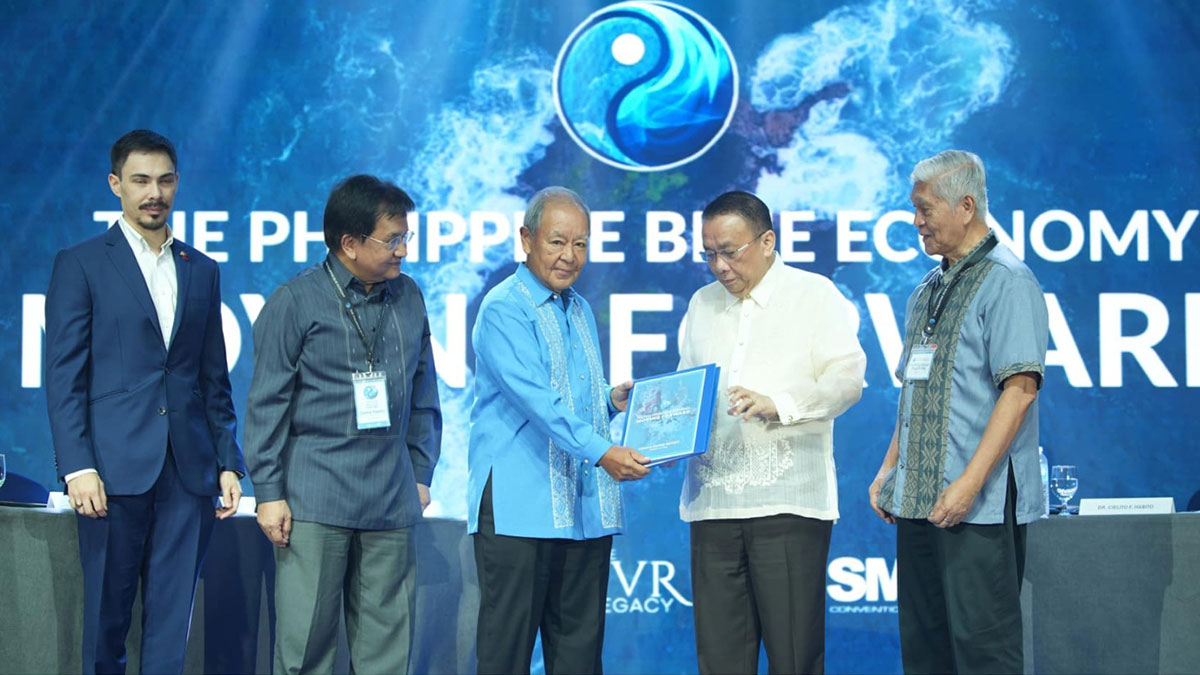Blue economy crucial in achieving food security

Former Finance Secretary Roberto de Ocampo (3rd from left), Chairman of the FVR Legacy Initiative hands over the Final Outputs of the round table discussions of the Philippine Blue Economy: Moving Forward to Executive Secretary Lucy’s Bersamin (second from right). Looking on are (from l to r) Sam Ramos-Jones (trustee, Ramos Peace and Development Foundation), former NEDA Secretary Dr. Cielito Habito, Secretary de Ocampo, Executive Secretray Bersamin and Mr. Edicio de la Torre (President of the Philippine Rural Reconstruction Movement)
Pursuing a blue economy in the country is a critical factor if the government wants to achieve food security anchored on sustainable practices and eventually lift millions of Filipinos out of poverty.
Various stakeholders recently gathered in a landmark multi-sectoral dialogue in a bid to integrate inputs for a comprehensive national strategy for the country’s transition to an inclusive blue economy.
Hosted by the FVR Legacy Initiative and the Philippine Rural Reconstruction Movement, the round table discussion on the blue economy titled “Philippine Blue Economy: Moving Forward” has brought together the key players, stakeholders and resource persons from the country’s various sectors to discuss the myriad issues that surround the country’s blue economy.
These include providing support for the objectives of the Blue Economy Act including sustainable development of our nation’s seas.
Four workshops tackled the blue economy’s burning issues concerning Fisheries, aquaculture and marine-based products, Energy, Maritime Transport and Coastal and Marine Tourism.
As a development model that balances economic growth with environmental protection, the blue economy looks into fisheries, aquaculture and other marine-based products and how it can help address food security in the country.
Economist and former director general of the National Economic and Development Authority Dr. Cielito Habito emphasized that fisherfolks are the poorest among the poor in the country due to several factors.
“This is due to a host of factors including declining fish catch, shrinking fishing grounds, depleting fish stocks,” Habito said.
This is also exacerbated by illegal, unregulated fishing, ecological degradation and limited access to infrastructure, markets and science-based policy support.
“And there’s a new complication, the recent Supreme Court decision that opens municipal waters to commercial fishers which has been rather controversial,” he said.
Bangsamoro director general for Fisheries Services, Ministry of Agriculture, Fisheries and Agrarian Reform Pen Patarasa said there are adverse effects of overlapping municipal water boundaries.
As such, he called for stricter regulations on fishing gear and practices, including banning superlights and regulating large commercial vessels.
Roberto de Ocampo, former Finance secretary and co-chairperson of the FVR Legacy Initiative, noted that under a blue economy, sustainable fishing practices will be done, effectively reducing overfishing and illegal fishing that harm the oceans and the livelihood of fisherfolks.
De Ocampo argued that managing marine resources well would boost fish stocks, thereby, providing steady food and income for all Filipinos.
“Sustainable aquaculture or fish farming can also help give fisherfolks alternative sources of income while reducing pressure on wild fish populations,” de Ocampo said.
Further, Habito explained that fisherfolks should be given wider economic options and opportunities such as fostering aquaculture and mariculture, especially via fisheries cooperatives as an alternative because of the problems beset by capture fisheries.
To address poverty among fisherfolks, stakeholders are pushing for strengthened social protection, expanded insurance access and the creation of direct subsidy mechanisms.
“We need to have an effective insurance system for fishers, similar to the Philippine Crop Insurance Corp. that provides insurance for our farmers,” Habito said.
They also called for a status quo in commercial fishing in municipal waters while awaiting final Supreme Court ruling, adding that existing bans must be strictly enforced.
Stakeholders are likewise lobbying for stronger fisherfolk representation in Congress, as well as the creation of a Department of Fisheries and Aquatic Resources amid weak governance.
“Despite the presence of existing laws on fisheries and marine protection, implementation gaps—particularly in enforcement, monitoring and stakeholder participation—remain a major concern,” they said.
Relatedly, other legislation pending in Congress apart from the Blue Economy Act includes the Center for West Philippine Studies and the National West Philippine Sea Day.
Subscribe to INQUIRER PLUS to get access to The Philippine Daily Inquirer & other 70+ titles, share up to 5 gadgets, listen to the news, download as early as 4am & share articles on social media. Call 896 6000.







